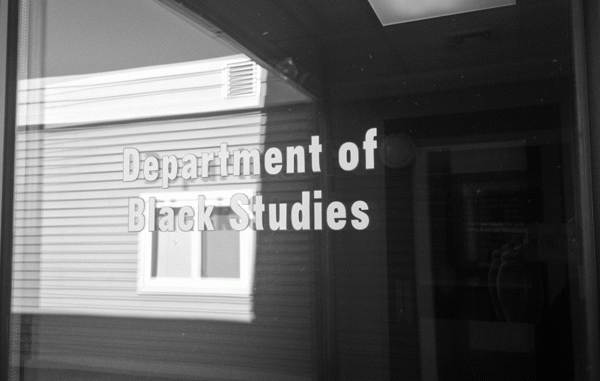
Once a week during the late ‘80s, Lecture Center Room 102 at SUNY New Paltz transformed into an open forum discussion for Black Student Union (BSU) meetings. On average the space remained crammed with 100 students, mostly from the Black Studies Department, discussing hot button issues and upcoming events. At the front of this arena for change stood president of BSU, Anthony Winn.
On Thursday nights, Winn and other students of color gathered in the television lounges around campus to watch “The Cosby Show” and “A Different World.” At least six black fraternities existed and countless other organizations such as New Day Ensemble and African Women’s Alliance (AWA) hosted numerous cultural events.
“It created this sense of presence and exposure that almost made people think that there were more students of color here than there actually were,” Winn said. “Couple that with a rich Black Studies Department and you’ve got a time that felt like the golden age of the black college experience here at New Paltz.”
Now, the Black Studies Department is suffering. Over the course of last year the department lost four tenured professors: two retired, one moved away and one switched departments. The sole remaining tenure track professor is Dr. Major Coleman, chair of the Black Studies Department. Winn returned this semester as Staff Assistant to Black Studies along with alumna and now adjunct faculty member Geneiva Moore in an attempt to rebuild the department.
According to Winn, he initially feared that Black Studies would lose its sense of community along with its faculty. He said that the department has historically been the place for student engagement, mentorship and support around issues of cultural identity on campus.
“In the absence of a strong faculty compliment, the chairman can’t do it all,” Winn said.
Coleman joined the department in 2008 and became chairman in 2011. He said that he hopes for the department to be fully staffed again but that will take at least two years.
“We are definitely at our lowest now,” Coleman said.
Yet, the department has already done so much for the campus and the community. It emerged at the height of the Civil Rights movement in the late ‘60s, several years prior to the establishment of Black History Month in 1976.
During this time of social unrest students of color on campuses demanded educational representation. According to San Francisco State University’s website, their Department of African Studies originated as the first Black Studies Department in 1968.
SUNY New Paltz followed close behind with the inception of their Black Studies Department in the spring of ’69 under the leadership of Chairwoman Dr. Marjorie Butler. After Butler, Margaret Wade-Lewis took her place as chair of the department and remained in the position until the age of 69 when she passed away.
Wade-Lewis’ obituary in The Daily Freeman said that she helped found the Scholar’s Mentorship Program (SMP), First World Diaspora Conference and the community group Concerned Parents of New Paltz.
According to Moore, professors like Wade-Lewis are the reason why the department is able to achieve their mission of educating and mentoring students. In 2009, during her last academic year, Wade-Lewis went above and beyond to help her.
The week before winter break they planned a meeting to go over Moore’s mission statement for graduate school. The day of their intended meeting it snowed and Moore laid in her off campus bedroom snowed in. She assumed that Wade-Lewis would have to reschedule, but the chairwoman called her and insisted that they go over the two-page statement immediately. She went line by line with Moore over the phone instead of driving home from campus to avoid the tumultuous roads ahead.
“If she didn’t do what she did I wouldn’t be here right now,” Moore said.
It is people like this that students such as third-year Black Studies major, Rosa Rosario currently feel the loss of. As vice president of BSU and a member of Black Studies Student Organization (BSSO) she consistently participates in raising awareness for the department.
Rosario recently worked with students and faculty members from the department to create an exhibit in Sojourner Truth Library on the history of the Black Studies Department at SUNY New Paltz. Twelve cases emerged each with a different theme in the entranceway of the library. According to Rosario, each theme is based on what’s important to Black Studies students and while assembling the ideas she reached out to students of color for their input.
“If there wasn’t a Black Studies Department and there wasn’t that community that it created then BSU, Latin American Student Union (LASU) and AWA and wouldn’t have come out of it,” Rosario said.
Students like Rosario are the reason Winn has faith in the future of the Black Studies Department. According to Winn, the students are excellent at engaging alumni of the department and connecting with them to ask for support and service during this time of transition.
“The students owning their value and expressing the value of the department to the broader campus community, the administration, and faculty has been fundamentally important,” Winn said. “Black History Month only came about because black history didn’t exist in the conversation of American society. That speaks to why it’s necessary for a Black Studies Department.”
